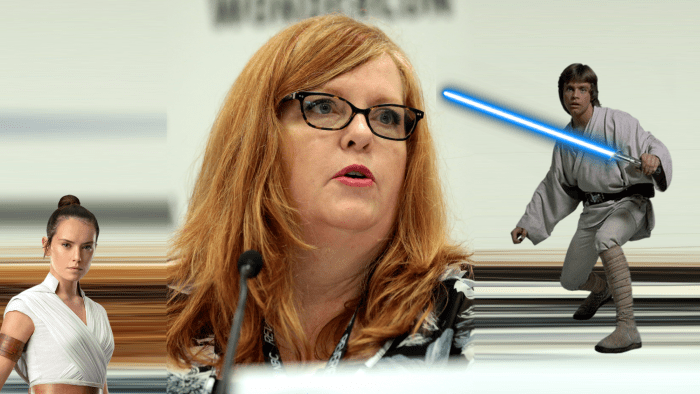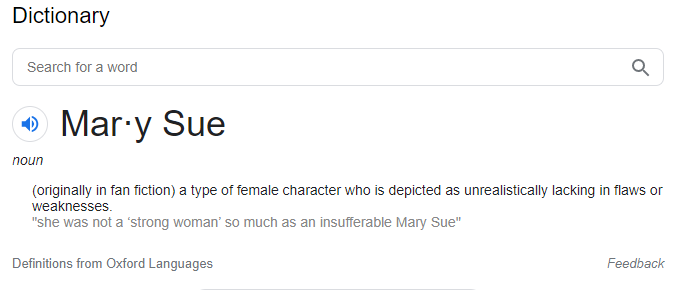Sorry Gail, But You're Using That Term All Wrong
FTC Statement: Reviewers are frequently provided by the publisher/production company with a copy of the material being reviewed.The opinions published are solely those of the respective reviewers and may not reflect the opinions of CriticalBlast.com or its management.
As an Amazon Associate, we earn from qualifying purchases. (This is a legal requirement, as apparently some sites advertise for Amazon for free. Yes, that's sarcasm.)

Some days the eyes roll so hard the pull at the optic nerve and make them just ache. Today is one of those days.
The Star Wars fandom has been split of the idea of Rey ever since The Force Awakens debuted in theaters. It's one of those debates that's never going to be settled, never going to have a substantial closure, because it's a matter of taste. You can't convince a person they don't like something that they do, and vice versa.
But there are some objective terms being bandied about that have been left unchallenged for too long -- long enough that the new definitions might be allowed to stick, which would undermine the actual meaning of the term. That term is "Mary Sue," which originated after a piece of Star Trek (ironically) fan-fiction in which a new crew mamber -- Mary Sue -- was brought on board the U.S.S. Enterprise and proved to be smarter than everyone else, as well as the objet d'amour of every male officer. it was a ridiculous character, with no room for character growth, and gave way to the name that defines all other such fictional characters who are similarly flawless.
But don't take our word for it.

Over time -- and without any informed objections to the contrary -- the term Mary Sue has come to mean a character who is an idealized self-insert of the author. And while this certainly can be the case, the two are separate literary mistakes, which don't necessarily require entanglement. That is a misconception, and it shouldn't go unchallenged. Because then it gets propagated by, appropriately enough, sites like The Mary Sue.
Which leads us to the latest Twitter-tempest among Star Wars fan: Is Luke Skywalker a Mary Sue?
The arguments for Rey being a Mary Sue are plentiful. Certainly she exhibited abilities of The Force that Jedi before her trained long and hard to achieve. Rey being able to Jedi mind-trick a Stormtrooper into releasing her from captivity -- without even knowing that such a thing could be done in the first place -- is one of the more obvious examples of her character's complete mastery of all things.
But according to comic book writer Gail Simone, Luke Skywalker is the Mary sue of the Star Wars universe.

Gail subscribes to the popular-but-false definition of a Mary Sue that requires a character be a self-insert. But even if it were the definition (it's not), the fact that Mark Hamill mimicked Lucas's mannerisms to get the part of Luke doesn't make Luke a self-insert. It means that Hamill used a very common technique to win friends and influence people known as mirroring. It is well-documented that the success of the original Star Wars trilogy owes much to Lucas following the path of literary success laid out by Joseph Campbell: Luke's tale is a nearly point-by-point study in "The Hero's Journey," in which a character is introduced, has flaws, fails, overcomes failures, denies his calling, and achieves success. Rey has no such growth arc, no journey, and, as a predictable result, no connection to the fans of the original shows.
The "Mary Sue" debate has garnered more attention of late, after Luke's character made an appearance on the successful Disney+ series, The Mandalorian, which had fans cheering for a version of Luke that appeared closer to the heroic Luke than did the Skywalker portrayed in the sequel trilogy.
Is Luke Skywalker a self-insert for George Lucas? Maybe. Certainly the "Lucas" vs "Luke S." argument can be made -- weakly. But even if Luke were a self-insert, he lacks any of the qualifying elements that would grant him the status of a Mary Sue, because -- once again for those in the back -- a Mary Sue is not defined by a character being a self-insert.
Which is why Riri Williams (Ironheart) and Keli Quintela (Teen Lantern) are both Mary Sues, despite looking nothing like Brian Michael Bendis.
But that's another topic for another day.


